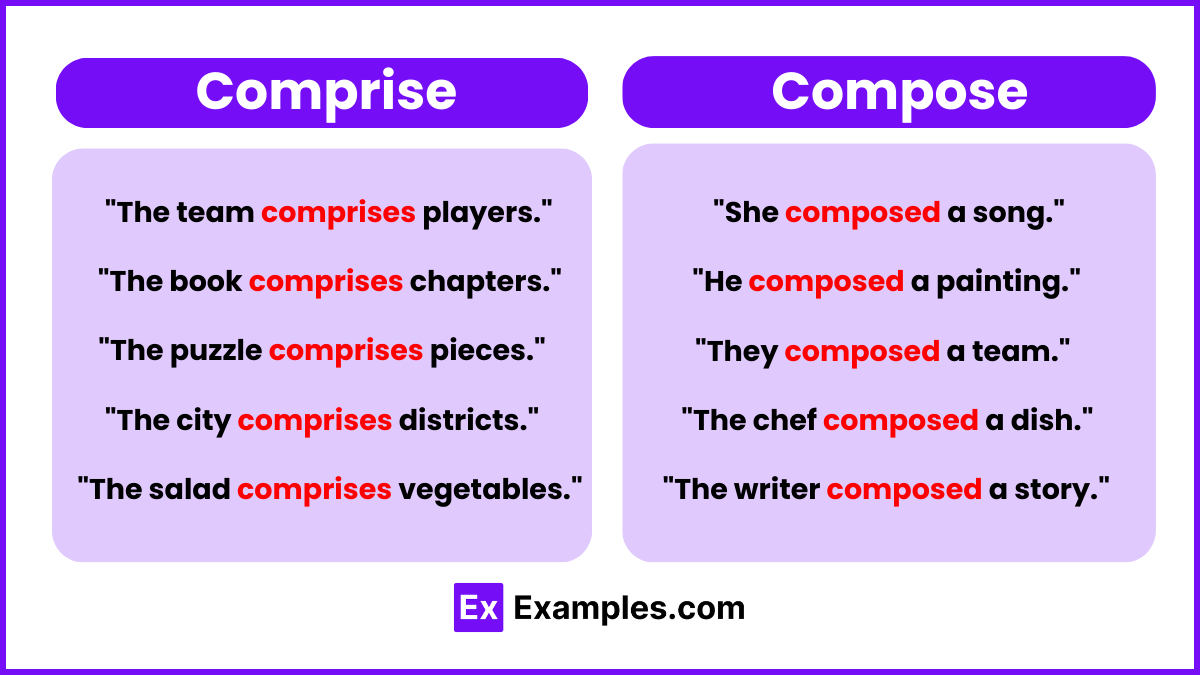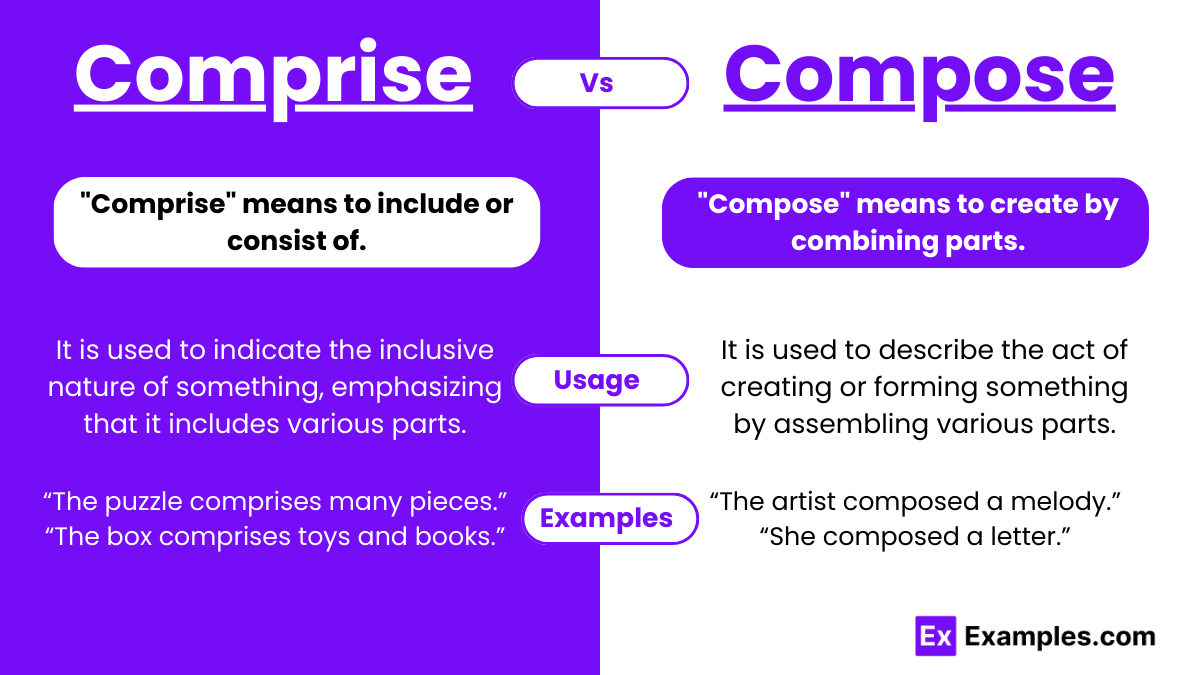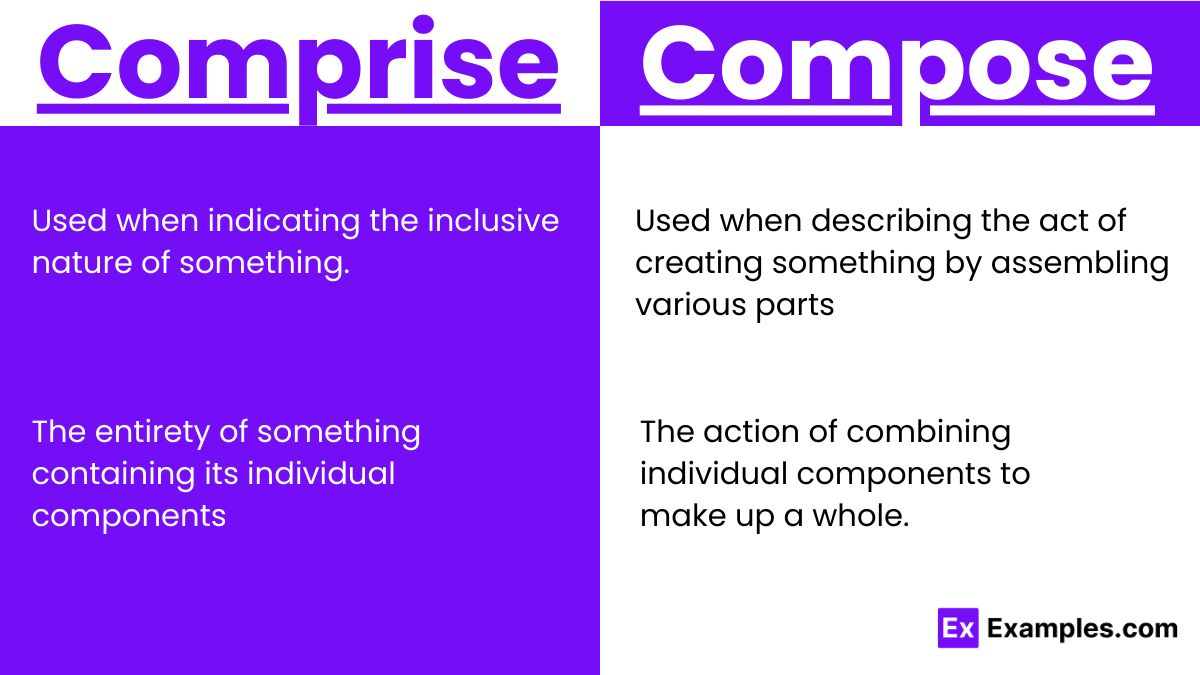Comprise Vs Compose – Meanings, Differences, Usage, Examples
Both are verbs, but they serve different purposes. “Compose” means to create or make up something, while “comprise” means to include or contain something. Understanding these verbs is essential for clear communication. Let’s explore examples and tips together to master their usage in writing
Comprise and Compose – Meaning
- Comprise: It indicates the inclusive nature of something, emphasizing that it contains or consists of various parts or elements. It focuses on the entirety of something containing the individual components. For instance, “The team comprises experts from different fields” emphasizes that the team includes members from various areas of expertise.
- Compose: It refers to the act of creating or forming something by putting together various elements or parts. It emphasizes the process of making up a whole from individual components. For example, when we say “The team is composed of experts from different fields,” we are highlighting how the team is formed by bringing together individuals with diverse expertise.
Summary
“Comprise” and “Compose” both describe the relationship between a whole and its parts, but they emphasize different aspects. “Compose” refers to the act of forming or making up something by assembling individual parts, highlighting the process of creation. Conversely, “comprise” indicates the inclusive nature of something, emphasizing that it contains or consists of various parts. So, while “compose” focuses on the parts forming the whole, “comprise” emphasizes the whole containing the parts.
How to Pronounce Comprise and Compose
- Comprise: Pronounced as \kəm-ˈprīz\ (kuhm-PRYZ), with the stress on the second syllable.
- Compose: Pronounced as \kəm-ˈpōz\ (kuhm-POHZ), with the stress on the second syllable.
Comprise and Compose – Differences
| Aspect | Comprise | Compose |
|---|---|---|
| Meaning | Means to include or be made up of various parts or elements. Emphasizes the whole containing parts. | Means to create or form something by assembling different parts or elements. Emphasizes the parts forming the whole. |
| Focus | Focuses on the entirety of something containing its individual components. | Focuses on the process of combining individual elements to create something larger. |
| Usage | Typically followed by the whole entity or group, indicating what it consists of. Often used in passive voice constructions. | Followed by the individual parts or elements that make up the whole. Often used in active voice constructions. |
| Example Sentence | “The team comprises experts from various fields, including marketing, finance, and technology.” | “The bouquet is composed of roses, lilies, and daisies, creating a beautiful arrangement.” |
| Structure | Indicates the collective whole. | Describes the process of assembly. |
| Emphasis | On the whole containing parts. | On the parts forming the whole. |
How To Remember the Differences Between Comprise and Compose
To remember the difference between “compose” and “comprise,” think of “compose” as putting things together, like building a puzzle, focusing on the parts forming the whole. Conversely, “comprise” indicates what the whole is made up of, like a container holding its contents. So, “compose” emphasizes assembling parts, while “comprise” highlights what the whole consists of.
Tricks
Comprise
COMprise = Contain: For “comprise,” focus on the idea of containment. The word “comprise” starts with “COM,” which is similar to “contain.” When you use “comprise,” you’re talking about what is contained within something larger. So, think of it as identifying all the parts or elements that make up the whole.
Compose
COmpose = Create: Think of “compose” as similar to the word “create.” Both start with the letters “C” and “O,” and they both involve making something new. So, when you need to describe putting parts together to make something, remember that you “create” or “compose” it.
When to Use Comprise and Compose
Usage of Comprise:
- Employed to indicate the inclusive nature of a whole entity, highlighting that it contains or consists of various parts or elements.
- Emphasizes the entirety of something containing its individual components.
- Frequently used to emphasize what the whole consists of or includes.
Usage of Compose:
- Used to describe the process of forming or creating something by assembling various parts or elements.
- Emphasizes the action of combining individual components to make up a whole.
- Commonly employed in contexts where the focus is on the act of assembly or construction.#
Usage Tips:
- When using “compose,” focus on how the parts come together to form the whole.
- When using “comprise,” highlight what the whole consists of or includes.
- Pay attention to the grammatical structure: “compose” is often followed by the individual parts, while “comprise” is typically followed by the whole entity.
How to Use
Comprise
- Use “comprise” when describing what makes up or is included within a larger entity.
- Typically, the larger entity comes before “comprise,” followed by the elements it contains.
- Apply “comprise” to list or identify the individual parts or elements that form a whole.
- Think of “comprise” as encompassing the entirety of something by listing its component.
Compose:
- Use “compose” when referring to the action of putting together or creating something from different parts.
- Typically, the subject performing the action of composing comes before the elements being put together.
- Apply “compose” to artistic or creative endeavors, such as music, literature, or artwork.
- Think of “compose” as making something whole or complete by assembling its parts.
Comprise and Compose – Examples

Comprise Examples:
- The United States comprises fifty states, each contributing to the country’s diversity.
- A pizza comprises various toppings such as pepperoni, mushrooms, onions, and cheese.
- A family comprises parents, children, grandparents, and sometimes pets.
- The solar system comprises planets, moons, asteroids, and comets orbiting the sun.
- A university comprises departments like biology, history, mathematics, and literature offering diverse courses.
Compose Examples:
- Building a sandcastle involves composing it from sand, water, and molds.
- An orchestra composes beautiful music by combining instruments like violins, trumpets, and drums.
- A salad is composed of lettuce, tomatoes, cucumbers, and dressing mixed together.
- Artists compose paintings using brushes, paints, and canvases to express their creativity.
- Writers compose stories by weaving together characters, plots, and settings to captivate readers.
Synonyms for Comprise and Compose
| Comprise | Compose |
|---|---|
| Consist of | Form |
| Include | Make up |
| Contain | Constitute |
| Embody | Comprise |
| Incorporate | Be made up of |
Common Mistakes
- Incorrectly using “comprised of” instead of “comprises” or “is composed of” instead of “composes.”
- Overusing passive voice with “comprise,” leading to awkward or unclear sentences.
- Neglecting to properly structure sentences with “compose” or “comprise,” resulting in ambiguity or confusion.
- Confusing the meaning of “comprise” as meaning “consists of,” which can lead to grammatical errors.
- Not recognizing the difference in meaning between “comprise” and “compose,” leading to misuse in writing and speech.
Exercises
Fill in the blank with the correct form of “comprise” or “compose”:
Q 1. The menu _______ a variety of dishes, including sushi, pasta, and salads.
Q 2. The bookshelf _____ of five shelves, each ______ books of different genres.
Q 3.The bouquet is ___________ of roses, tulips, and daisies.
Q 4.The orchestra ___________ musicians playing various instruments.
Q 5. The cake is ___________ of layers of sponge, cream, and fruit
Answer
A 1. comprises
A 2. comprises, composed of
A 3. composed
A 4. comprises
A 5. composed
FAQ’S
Should I use comprised or composed?
Use “composed” when referring to the act of assembling parts to form a whole. Use “comprised” when indicating what the whole consists of.
Is a team comprised of or composed of?
A team is composed of its members, as “composed” emphasizes the action of putting together individual parts to form the whole.
What word can I use instead of comprise?
Instead of “comprise,” you can use “include,” “contain,” “consist of,” or “be made up of” to convey a similar meaning.
Are there any specific rules to remember when using “comprise” or “compose”?
Yes, remember that “comprise” is often followed by the whole, while “compose” is followed by the individual parts.
For example, “The United States comprises fifty states” (whole), whereas “Fifty states compose the United States” (parts).
Can “comprise” and “compose” be used interchangeably?
No, they are not interchangeable. “Comprise” is used when referring to the whole containing parts, while “compose” is used when referring to the parts making up the whole.




